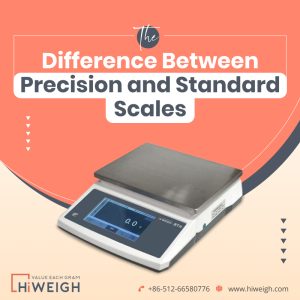


One of the most essential tools in a healthcare industry, manufacturing setting, or retail firm is a set of scales. With so many types of weighing instruments, some common types include precision weighing scales and standard weighing scales. They seem identical, but variations in functionality, accuracy, and uses set them apart. Knowing the differences can guide you in making the right choice according to your requirements.
Accuracy and Sensitivity
One of the biggest differences between precision and standard weighing scales is their accuracy and sensitivity. Precision weighing scales are made to give very accurate measurements, even down to a small part of a gram or milligram. This makes them perfect for places where exact measurements are very important, like in labs, medicine, and jewellery making.
Standard weighing scales can be used to weigh common objects that do not require highly sensitive measurements. Normally, they record measurements in amounts such as grams, kilograms, or pounds, hence making them excellent for weighing grocery items, sacks, or bags. They may be relied on for day-to-day weighing due to their high dependability. However, they are far less sensitive than those precision scales.
Measurement Range
The other difference is that of maximum weight, as the precision weighing scale mainly has a small limit that usually measures between a few grams and several kilograms. This is because they mainly aim to provide very accurate readings for lighter items. For example, a precision scale in a laboratory might be able to weigh up to 1 kilogram but measure as small as 0.001 grams.
Regular weighing scales are designed to weigh heavier weights. They usually measure from a few kilograms to hundreds of kilograms or even more. A normal bathroom scale can weigh a person up to 150 kilograms, but a big industrial scale can weigh over 1,000 kilograms. However, such scales do not have the small measurement accuracy that is needed for special uses.
Applications and Use Cases
The choice between precision and standard weighing scales is more or less based on how they are going to be used. Precision scales are extremely important in places where small weight differences can result in big problems. For instance, in scientific research, precise measurements are required to ensure the correctness of experimental results. Similarly, in the pharmaceutical industry, even a minute change in weight can affect how well drugs function, which is why precision scales are required.
Standard weighing scales are more general and more adaptable to the variety of daily applications. They can be found in homes, retail stores, warehouses, and shipping centers. From measuring ingredients in a kitchen to weighing goods for shipment or checking your body weight, standard scales provide a reliable and straightforward solution.
Design and Technology
A precision weighing scale often has advanced technology to make it more accurate and useful. Many models come with digital screens, built-in calibration systems, and the option to measure in different units. Some high-end precision scales also include features like Bluetooth to transfer data, which makes them good for today’s tech-friendly settings.
Standard weighing scales are much more simple in terms of design and operation. Even modern standard scales that provide digital readouts often still place the primary emphasis on strength and practicality rather than state-of-the-art technology. For instance, a dial scale installed in the bathroom for measurement would likely not boast many of the bells and whistles of an exact scale, yet it adequately fills the general measurement requirement for its purpose.
Conclusion
Both precision and standard weighing scales possess distinct strengths and limitations, rendering them appropriate for various applications. Precision scales shine in providing exceptionally accurate measurements tailored for specialised tasks, whereas standard scales present versatility and practicality suited for daily use. By grasping the fundamental differences, ranging from accuracy and measurement scope to applications and cost, you are better equipped to select the scale that most effectively fulfils your needs.
Whether it is a need for laboratory work or household and industrial applications, the selection of the appropriate type of weighing scale can ensure both efficiency and dependability in your weighing processes. The choice therefore depends on the degree of precision needed and the purpose of the measurement. With the right selection, you are assured that your weighing requirements will be fulfilled with both accuracy and efficiency.
